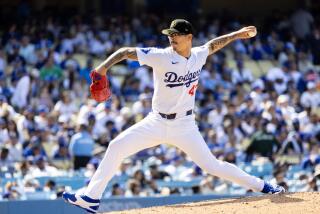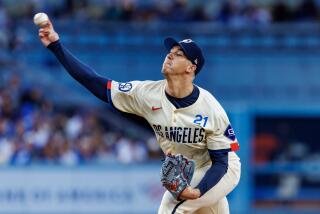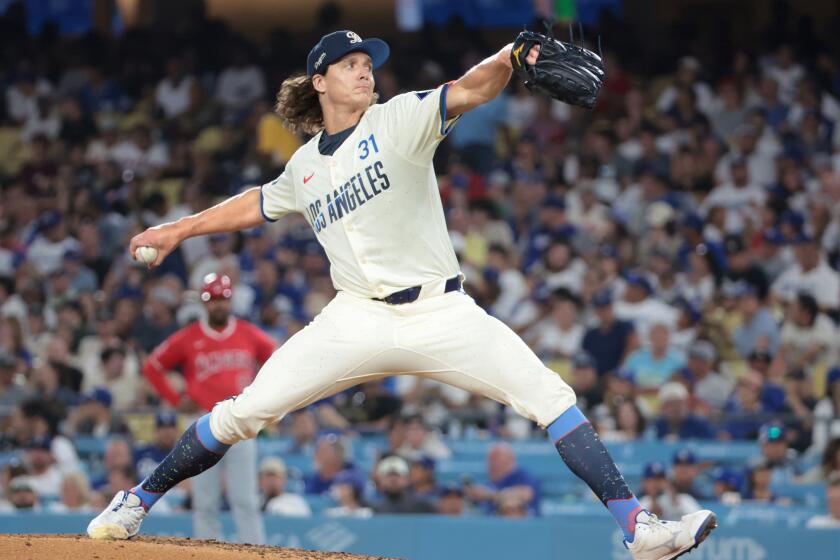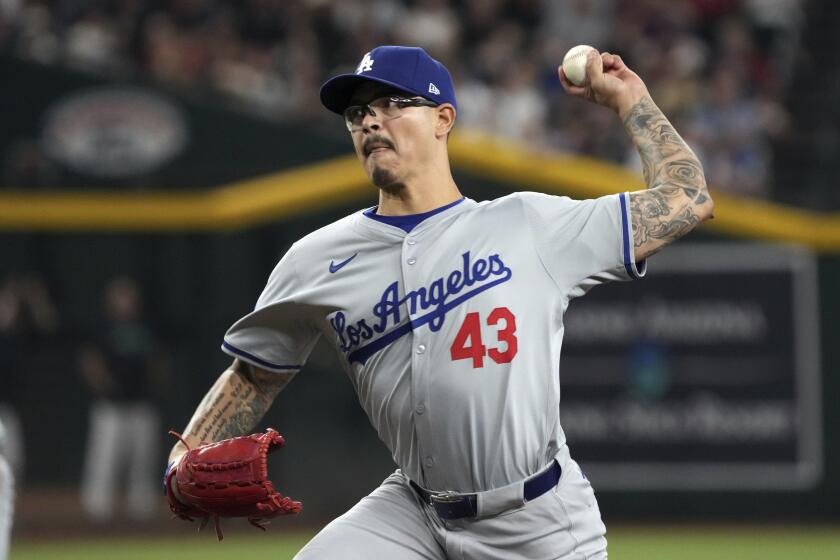Brooks Becomes Odd Man Out, Is Dealt for Ojeda : Dodgers: Trade, combined with signing of free agent Butler, solidifies the outfield situation and provides a left-handed pitcher.
One of the Dodgers’ most popular players became a surprising victim of their outfield crunch Saturday when Hubie Brooks was traded to the New York Mets for left-handed pitcher Bob Ojeda and pitching prospect Greg Hansell.
The trade was completed almost exactly 24 hours after the Dodgers acquired free agent center fielder Brett Butler. That agreement enabled Darryl Strawberry to move to right field, essentially forcing the Dodgers to either trade right fielder Brooks or move him to left field and trade Kal Daniels.
Many players thought Daniels, 27, would be traded because he is seven years younger that Brooks and has a higher market value. And many players, admiring Brooks’ quiet leadership and clutch hitting, hoped he would stay.
“Hubie didn’t have one enemy--Hubie was one of our cornerstones,” outfielder Chris Gwynn said.
Fred Claire, the Dodger vice president who did not flinch last season when trading team leader Willie Randolph during a losing streak, might have ignored chemistry again.
“Yes, I am concerned about chemistry, but we now have a ballclub that should produce victories . . . and victories produce chemistry,” Claire said.
Claire is counting on Ojeda as the only left-hander in a starting rotation that includes Ramon Martinez, Tim Belcher, Kevin Gross and Orel Hershiser when he is sound.
This rotation could also include Fernando Valenzuela if he accepts the club’s offer for a one-year arbitrated contract. But Valenzuela, meeting with advisers this weekend, might feel squeezed out by Ojeda and refuse the Dodgers’ offer.
Yet Valenzuela could surprise the Dodgers, as did Juan Samuel by accepting a similar offer Saturday morning. Samuel will compete for the second base job this spring.
“If Fernando comes back, that will please us . . . it will give us a pitching surplus, and we will use that surplus,” Claire said.
Statistically, Ojeda is a suitable replacement. In parts of 11 major league seasons, mostly as a starter, he is 95-79 with a 3.65 earned-run average.
Last season, after being left out of a crowded Met rotation, Ojeda was 7-6 with a 3.66 ERA in 38 games, including 12 starts. He held left-handed batters to a .168 average.
“I feel like a big kid being back home,” said Ojeda, a Los Angeles native, in a conference call Saturday night.
“I grew up like everybody down there, watching Vin Scully and the Farmer John Hot Dog.”
Tom Lasorda, Dodger manager, announced on the call that Ojeda would no longer be in the bullpen.
“That is music to my ears, Tommy,” said Ojeda, who will turn 33 next week. “You are the maestro down there. I am looking forward to this year like I’ve looked forward to no other year.”
He added: “The bullpen, I don’t like it. I’m not ready for it. When I’m 37, I’ll be ready for it. I have proved, when I get a chance, I can still pitch.”
Lasorda said that Ojeda completes the Dodgers 1991 team, even if the roster doesn’t include a veteran left-handed relief pitcher. Their only veteran in that area, Ray Searage, was released Friday to make room for Butler.
“I can get around that--we have Dennis Cook and David Walsh, we’ll be fine there,” Lasorda said, later adding, “I’m very happy with this ballclub with the way it is set. If the season started tomorrow, we’d be ready to go.
“I’ll tell you this much, a lot of pitchers who pitch against this club, the night before they go to sleep, they are going to be doing a lot of tossing and turning.”
One problem for the Dodgers is that most of those pitchers will be left-handed. Because they traded Brooks instead of Daniels, four of the Dodgers’ top five power hitters will bat left-handed. This includes Strawberry, Butler, Daniels and Mike Scioscia. Only switch-hitting Eddie Murray will keep left-handed pitchers honest.
“Yes, I’ll admit, we are overbalanced in that area,” Lasorda said.
The Dodgers will miss Brooks in other ways, and not only because he was third on the team with 20 home runs and 91 runs batted in.
“Hubie was one of the three or four people Tommy could always count on,” Gwynn said.
“He brought this team stability.”
And Brooks will miss the Dodgers. The Southland native believed he had returned home for good last winter when he signed a three-year contract as a free agent from Montreal.
When Brooks was told about the acquisition of Butler late Friday, he reacted with dismay.
“It does look like I’ve lost a job,” Brooks said at the time. “I can’t believe it. I do feel like the odd man out. What are they going to do?”
Gwynn said Brooks, who could not be reached late Saturday, phoned him immediately after the trade.
“Hubie was shocked,” Gwynn said. “You could tell he was really disappointed.”
Said Claire: “I loved Hubie. Trading him was one of most difficult things I ever have had to do.”
At least one Dodger was understandably happy about the move.
“I just got home to spend Christmas with my family, and this is one great present,” Daniels said late Saturday from his Warner Robins, Ga., home.
“I feel bad for Hubie, and I thought I would be the one traded because my trade value was higher, but I am glad they didn’t choose me.
“I am really happy to stay in Los Angeles. It looks like our puzzle is all coming together. We are looking like a championship team.”
Greg Hansell, the other Met acquired in the Brooks trade, is a former 12th-round draft pick from La Palma Kennedy High in Orange County. He is a right-hander who spent last season in Class A. He was 7-10 with a 3.60 ERA for Winter Haven, Fla., of the Boston Red Sox’s organization, then was traded to the Mets and went 2-4 with a 2.61 ERA for St. Lucie, Fla.
Dodger Notes
The Dodgers finally announced that they had agreed to terms with Brett Butler at 8 a.m. Saturday, 12 hours after Butler had confirmed it. Fred Claire, Dodger vice president, did not announce it sooner because he had promised Dick Moss, Butler’s agent, that he would give Moss time to contact the two other teams bidding for Butler’s services, Atlanta and Boston. Lou Gorman, Boston general manager, did not return home until late Friday, and was not contacted until Saturday morning. Butler was given a $1-million signing bonus with a $2.5-million salary next season, $3 million in 1992, $3 million in 1993, and a $3-million option in 1994 with a $500,000 buyout.
More to Read
Are you a true-blue fan?
Get our Dodgers Dugout newsletter for insights, news and much more.
You may occasionally receive promotional content from the Los Angeles Times.











